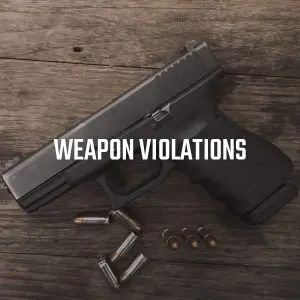 Federal firearms violations are investigated by the Bureau of Alcohol, Tobacco, Firearms, and Explosives (ATF). However, federal cases can also arise from an “adoption” of a state or local law enforcement gun charge. That means you could be arrested on state charges and the ATF then picks up the case for federal prosecution.
Federal firearms violations are investigated by the Bureau of Alcohol, Tobacco, Firearms, and Explosives (ATF). However, federal cases can also arise from an “adoption” of a state or local law enforcement gun charge. That means you could be arrested on state charges and the ATF then picks up the case for federal prosecution.
Federal firearms statutes apply to people involved with the sale, possession, purchase, or use of guns, including manufacturers, dealers, and owners. Federal law requires everyone in the business of dealing, manufacturing, or importing firearms or ammunition to be properly licensed. Additionally, it is a crime to make a false statement with respect to any records required for the licensing and purchase of firearms.
Commonly charged federal firearms violations include:
- illegal possession of a firearm by a prohibited person;
- possession of a firearm during a violent crime or drug transaction;
- illegal sale of a firearm;
- illegal trafficking of a firearm;
- illegal altering, destroying or removal of a serial number;
- possession of a firearm by a convicted felon;
- possession of an unregistered firearm; and
- straw purchase(s) of a firearm.
The two most commonly charged firearms offenses are (1) unlawful possession of firearms by convicted felons and (2) firearms used in the commission of a violent crime or drug offense.
Unlawful Possession of a Firearm or Ammunition
Some people are not allowed to possess a firearm or ammunition. Under federal law, it is unlawful for certain categories of people to possess any firearm or ammunition. Specifically, you are prohibited from possessing a firearm or ammunition if you:
- are a convicted felon;
- are a fugitive;
- unlawfully use or are addicted to drugs;
- have previously been committed to a mental institution;
- are in the United States unlawfully;
- have been dishonorably discharged from the Armed Forces;
- have renounced your citizenship;
- have a restraining order against you; or
- have been convicted of a domestic violence crime.
Possession or Use of a Firearm in Relation to a Violent Crime or Drug Trafficking
Federal firearms offenses arising out of the use or carrying of a firearm during a violent crime or drug trafficking offense can carry severe penalties. In addition to the penalty received upon a conviction of the underlying offense, a defendant faces a consecutive mandatory minimum prison sentence starting at five years. That consecutive penalty can increase with the severity of the circumstances. For example, if the firearm is brandished or displayed during a violent crime or drug trafficking offense, the consecutive mandatory minimum becomes 7 years and, if the gun is fired, it becomes an additional 10 years. For repeat offenders who have committed crimes involving machine guns or silencers, the sentence can increase to up to a life sentence.
To convict a defendant on this type of charge, the government must prove that the use or possession of the firearm was related to a drug trafficking offense or a crime of violence. It is not even necessary that a defendant carry the firearm during the crime.
Defending Against Firearms Charges
Developing a strategy to defend against a federal charge of unlawful firearm possession involves a careful consideration of the surrounding facts. It requires skilled counsel to determine which elements of the prosecution’s case are the most vulnerable.
At Haas Law, you can expect to hire a criminal defense lawyer with extensive experience representing people in federal court can provide aggressive counsel regarding your case. Contact us online or call us at 407-755-7675 to make an appointment to discuss your case with an experienced defense attorney.
